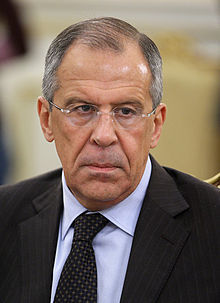Sergei Lavrov | Russian Foreign Minister
QUESTION: Ambassador, it’s great to have you with us. I want to ask you about one of Russian Foreign Minister Sergei Lavrov’s stronger comments that he made today.
FOREIGN MINISTER SERGEI LAVROV: As was the case in the Cold War, we have reached a dangerous, possibly even more dangerous, threshold. The situation has been worsened by the loss of and faith in multilateralism.
QUESTION: What do you make of that?
AMBASSADOR LINDA THOMAS-GREENFIELD: If there is any loss of trust in multilateralism, it’s Russia’s fault. We’re dealing with some really critical issues – a pandemic, climate change, issues of war and peace. And right at that point, Russia invades one of its smaller neighbors, really just challenging the entire foundation of the UN Charter, challenging all the values that we have all worked on since the founding of the United Nations.
So, if this is an issue for the Russians, they are responsible for creating that issue. Their hypocrisy today was unbelievable, the fact of them calling for a discussion of multilateralism when they have taken such an aggressive unilateral action as to attack one of their neighbors.
QUESTION: Observers there at the UN see Lavrov’s speech as a direct provocation of the West. How do you deal with that type of provocation?
AMBASSADOR THOMAS-GREENFIELD: They didn’t just provoke the West. They provoked the entire UN system. They provoked every single Member State. And I still think it’s important for us to point out that 141 countries condemned their actions, and they heard all 14 members of the Security Council in different ways stand up for the values of the UN Charter and condemn their actions as being actions that bring into question their own commitment to multilateralism, their own commitment to the UN system.
Their unprovoked aggression against Ukraine can’t be justified. It can’t be put in front of us as a defense of multilateralism. What Russia needs to do is pull their troops out of Ukraine and end this war.
QUESTION: You accuse Russia of violating international law by wrongfully detaining Americans. So, you called for the release of the Wall Street Journal reporter Evan Gershkovich and also ex-Marine Paul Whelan, and you actually invited his family to that session today. Are you making any attempt to speak to Sergei Lavrov about these two Americans?
AMBASSADOR THOMAS-GREENFIELD: The Secretary of State has spoken to Lavrov, and I have spoken to my counterpart here in New York, their Permanent Representative Vasily Nebenzya, and raised this at that level. I have no plans to meet with Lavrov, but he knows what our position is, and he heard my statement loudly and clearly today in the Council.
QUESTION: The UN Security Council is supposed to prevent wars like the one we’re seeing right now. Is it a failure of the body that Russia has already invaded a country before – we know with Crimea – can invade another, invade another, rather, and also preside over this body?
AMBASSADOR THOMAS-GREENFIELD: It’s shaken the confidence of Member States in the Council, but the Council continues to function. We’re continuing to deal with peace and security issues across the globe. We will be meeting tomorrow on the situation in Sudan. We have addressed the situation in Libya. We met last week on the situation in Yemen. So, the Council functions despite – in spite of Russia’s unprovoked attack on Ukraine. But certainly what they are doing has made the world look at the Council in a different way, and it’s really impressed upon us how important it is to look at Security Council reform and to really evolve the Security Council to take into account the issues of peace and security that we’re facing today, many of them different from what we faced almost 80 years ago when the UN was created.
QUESTION: What kind of reform would prevent one of the permanent members from invading another country?
AMBASSADOR THOMAS-GREENFIELD: First and foremost, we need to make the Council more representative of the world. So right now, there are no African permanent representatives on the Council, no one from Latin America as a permanent representative on the Council. So, to expand the Council and make it more representative is one of the things that we would certainly look to doing.
QUESTION: You mentioned Latin America. We know that Sergei Lavrov, previous to his trip to New York, traveled through South and Central America, including Cuba. Are you concerned about Russia’s growing influence in the region?
AMBASSADOR THOMAS-GREENFIELD: Russia is trying their best to get as many countries on their side as possible. But the truth of the matter is only five countries have consistently supported Russia in the resolutions that we have brought before the General Assembly. So, they are in a minority community and they’re fighting to bring more people into their sphere, and they’re failing at that effort.
QUESTION: Ambassador Linda Thomas-Greenfield, thank you very much for joining us.
AMBASSADOR THOMAS-GREENFIELD: It’s really been wonderful to be with you, Sumi. Thank you for having me.
Original source can be found here.


